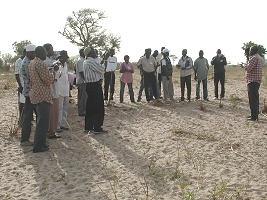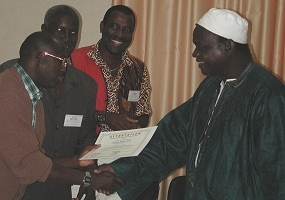
Soil Test Kit Training Course ISRA (L'Institut Sénégalais de Recherches Agricoles) organized a regional workshop to describe and demonstrate the effectiveness of decision support tools for farmers and extension agents in Bambey, Senegal from December 6 to 9, 2004. More than 48 participants attended. Most were extremely interested in the opportunity to learn of a more efficient and effective means of taking the guesswork out of fertilizer recommendations. The workshop included sessions from technical presentations to hands-on discussions and demonstrations on concepts of soil sampling, testing, use of quick soil test kits and decision support software for nutrient diagnosis and recommendations. The workshop became an unexpected news event, when a local television news station provided media coverage of the meetings for the first time. 
Modou Sène (far right) explains soil sampling techniques to the workshop participants. Modou Sène of ISRA, (the principal SM CRSP collaborating organization in Senegal,) organized the program with assistance from UH scientist, Richard Kablan. Reports on diagnostic and evaluation tools, developed by the SM CRSP and its collaborators, were the principal topics of the workshop. Adoption of these tools and associated methods for their use by scientists, extension agents and farmers will hinge on the demonstrated capacity of these decision support tools. For too many years, African farmers had no access to tools and information that would allow them to choose options leading to improved crop performance. However, site-specific tools presented at the workshop will now enable farmers and extension agents to diagnose nutrient deficiencies or excesses and choose a prescribed recommendation to fit their economic needs and aspirations. The soil test kit and the Nutrient Management Support System (NuMaSS) software program were developed by SM CRSP collaborators at Kasetsart University in Thailand. Both tools allow for site-specific support to the farmer directly or through an extension agent. Moreover, NuMaSS is a globally applicable software program made site-specific with inputs of local soil, crop and management information. Current soil testing capacity in most parts of Africa is scarce due to lack of testing facilities, modern instrumentation and trained personnel. As a result, there are acute delays in soil analyses, processing and delivery to farmers. Because of the limited resources, soil testing services are either not available or useless to farmers. In the latter case, recommendations are typically received well after planting of crops. In most of Africa and the developing world, general fertilizer application rates (also referred to as blanket application rates) are commonly the only fertilizer recommendation available for all crops on all soils in a country or region. The results are obvious. Lower crop yields due, in most cases, either to little or no fertilizer application, or excess fertilizer rates resulting in inefficient use and pollution of water resources. 
Workshop participants get 'hands on' training with the soil test kit. Soil testing is an essential component of sustainable land use. The availability of accurate and simple soil test kits, designed for use in the field, is an obvious advantage to growers, extension agents and soil scientists. Its low cost and fast delivery of test results, when coupled with NuMaSS predictions for nutrient diagnosis and recommendations, would bypass the time and cost constraints associated with traditional laboratory analyses. Nutrient deficiencies can be corrected and managed to allow farmers choices to achieve their anticipated crop yields. Why use the soil test kit (the Kit) from Kasetsart University in Thailand? For years, soil test kits were available from U.S. companies like Merck, Hach and other sources. The Kit was evaluated in Thailand through a FAO-supported program and found to be acceptable as a supplementary test to laboratory analysis in many field-based testing. Farmers, extension staff and soil scientists in Thailand now use more than 10,000 Kits to analyze soil samples and to make in situ fertilizer recommendations. The popularity of the Kit can be traced to two factors:
The Kit is designed to be simple and easy to use. The estimated cost to analyze a single soil sample for nitrogen, phosphorus, potassium and acidity is less than US$3. 
Workshop participants are awarded certificates. For more information on the workshop or the decision support tools described in this report, refer to sections at this SM CRSP URL under NuMaSS.  Return to news Return to news
|